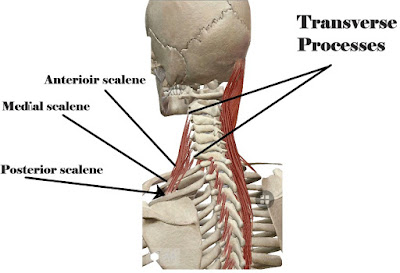Scalene Muscle Stretch
click on link more about Scalene↓↓↓↓↓↓
Scalene Muscle origin ,Insertion,Innervation , Action,blood supply
CLINICAL TIP
Because the scalene muscles are attached to the transverse
processes of the upper cervical spine and the upper two ribs.
scalene muscle contract bilaterally flex the cervical spine or elevate the upper
ribs . Unilaterally scalenes side bend the cervical spine to the same side and rotate it to the opposite side.
To effectively stretch this muscle, stabilize the head and
apply the stretch force against the upper portion of the rib cage.
Manual Stretching
Patient position and procedure:⏩
Sitting. The patient first performs axial/ neck extension (bucks the chin and straightens the neck) and then side bends the neck opposite and rotates it toward the tight muscles.
Stand behind the patient and stabilize the head with the one hand around the side of the patient's head and face, holding the head against your trunk or shoulder. Place the other hand across the top of the rib cage on the side of tightness
 Instruct the patient to inhale and exhale; apply
a (resisting elevation of the rib cage) as the patient
inhales again. As the patient relaxes (exhales), take up the slack. Repeat.
This is a gentle, hold-relax stretching menuver. This technique can also be
done in supine.
Instruct the patient to inhale and exhale; apply
a (resisting elevation of the rib cage) as the patient
inhales again. As the patient relaxes (exhales), take up the slack. Repeat.
This is a gentle, hold-relax stretching menuver. This technique can also be
done in supine.
Patient position and procedure:⏩
Sitting. The patient first performs axial/ neck extension (bucks the chin and straightens the neck) and then side bends the neck opposite and rotates it toward the tight muscles.
Stand behind the patient and stabilize the head with the one hand around the side of the patient's head and face, holding the head against your trunk or shoulder. Place the other hand across the top of the rib cage on the side of tightness
 Instruct the patient to inhale and exhale; apply
a (resisting elevation of the rib cage) as the patient
inhales again. As the patient relaxes (exhales), take up the slack. Repeat.
This is a gentle, hold-relax stretching menuver. This technique can also be
done in supine.
Instruct the patient to inhale and exhale; apply
a (resisting elevation of the rib cage) as the patient
inhales again. As the patient relaxes (exhales), take up the slack. Repeat.
This is a gentle, hold-relax stretching menuver. This technique can also be
done in supine.
Unilateral active stretching of the scalene
muscles manual stretch The patient first performs Neck/axial extension, then side bend the neck opposite and rotates it toward the tight muscles The therapy
stabilize the head and upper thorax as the patient breathes
Contracting the muscle against the therapist's resistance As the patient relaxes, the boage lowers and stretches the muscle
Contracting the muscle against the therapist's resistance As the patient relaxes, the boage lowers and stretches the muscle
Self-Stretching Patient position and procedure: ⏩
Standing next to a table and holding onto underside. The patient positions the head in axial extension, side bends opposite, and rotates toward the same side as the muscle being stretched. To stretch, he or she leans away from the table, inhales, exhales, and stretch position
Standing next to a table and holding onto underside. The patient positions the head in axial extension, side bends opposite, and rotates toward the same side as the muscle being stretched. To stretch, he or she leans away from the table, inhales, exhales, and stretch position
Techniques to Increase Upper Arms Flexion: Short
Suboccipital Muscle Stretch ⏩
Manual Stretching Patient position and procedure:
Sitting. Identify the process of the second cervical vertebra and stabilize your thumb or with the second metacarpophalangeal joint and the thumb and index finger around the transverse process. Have the patient slowly nod, doing just a tipping motion of the head on the upper spine Guide the movement by placing the other hand across the patient's forehead.
Sitting. Identify the process of the second cervical vertebra and stabilize your thumb or with the second metacarpophalangeal joint and the thumb and index finger around the transverse process. Have the patient slowly nod, doing just a tipping motion of the head on the upper spine Guide the movement by placing the other hand across the patient's forehead.
Stretching the short Suboccipital muscles. The
therapist stabilizes the second cervical vertebra as the patient slowly nod
the head
Self-Stretching ⏩
Patient position and procedure: Supine or sitting. Instruct the patient to first perform a chin tuck (axial extension, then nod the head, bringing the chin toward the larynx until a stretch is felt in the suboccipital area.
Patient position and procedure: Supine or sitting. Instruct the patient to first perform a chin tuck (axial extension, then nod the head, bringing the chin toward the larynx until a stretch is felt in the suboccipital area.
Have the patient put a light pressure under the occipitale region with the palm of his or her hand while tipping the head forward to
reinforce the motion.
For a unilateral stretch, instruct the patient to first
perform a chin tuck, rotate slightly (up to 15") to the left or and then nod
NOTE: The weight of the head is enough stretch force in
exercises the patient should not pull on the head when is cervical
pathology
CLINICAL TIP
Shoulder girdle posture is directly related to cervical and thoracic posture Techniques to increase flexibility in the shoulder girdle muscles are described in
Click on topic for more informations








Post a Comment
If you have any doubts any queries so contact me on social media account and send mail